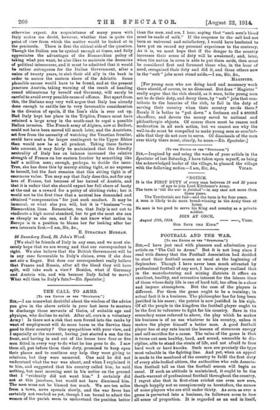THE CALL TO ARMS.
[To SHE EDITOR Or THE "spEciaros.'i
am somewhat doubtful about the wisdom of the advice you give in the above article in your last issue to masters to discharge those servants of theirs, of suitable age and physique, who decline to enlist. After all, ours is a voluntary Army I Is there not a risk that men forced into the ranks by want of employment will do more harm to the Service than good to their country ? One sympathizes with your view, and I especially at the moment, having just started a son for the front, and having in and out of the house here four or five men fitted in every way to do what he has gone to do. I saw them all, put before them their duty, promised to keep open their places and to continue any help they were giving to relations, but they were unmoved. One said he did not understand what the war was about, and when I explained it to him, and suggested that his country called him, he said nothing, but next morning sent in his notice on the ground that I "evidently did not want him." I certainly did not at this juncture, but would not have dismissed him. The men must not be blamed too much. We are ten miles from a town, news spreads slowly, and the war fever has certainly not reached us yet, though I am bound to admit the women of the parish seem to understand the position better than the men, and are, I hear, saying that "such men's blood must be made of milk." If the response to the call had not been so universal and satisfactory, I would have hesitated to have put on record my personal experience to the contrary. As it is, we must hope that if the danger to the country increases their sense of duty will be awakened; and, later, when the nation in arms is able to put them aside, then must be considered first and foremost those who, in the hour of need, recognized their duty and did it, and these others now in the " soft " jobs must stand aside.—I am, Sir, &c., MAGISTER.
[For young men who are doing hard and necessary work there should, of course, be no dismissal. But does "Magistee " really argue that the rich should, as it were, bribe young men not to do their duty, and decoy them, by " soft" jobs that con- tribute to the luxuries of the rich, to fail in the duty of serving their country when their country needs them ? Surely it is better to "put down" a footman and a second chauffeur, and devote the money saved to national and philanthropic objects. Of course there must be reason and moderation in all such action, but we cannot see why the well-to-do must be compelled to make young men so conil2ort- able that they do not care to serve. Of dismissals of the men over thirty there must, clearly, be none.—En. Spectator.]


































 Previous page
Previous page